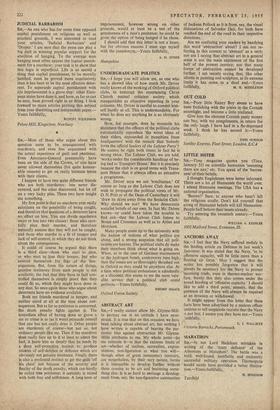UNDERGRADUATE POLITICS
SIR,—I hope you will allow me, as one who has a shrewd idea of how much Mr. Driver really knows of the working of Oxford political clubs, to interrupt the entertaining Christ Church mutual criticism society which masquerades as objective reporting in your columns. Mr. Driver is careful to commit him- self hardly at all. This is understandable. For when he does say anything he is so obviously wrong.
How, for example, does he reconcile his statement that the officers of the political clubs automatically reproduce 'the worst ideas of their elders, expounded in pamphlets from headquarters' with the remark that 'nobody loves the official leaders of the Labour Party"? He cannot be right both times; in fact he is wrong twice. The Labour Club, we are told. 'works under the considerable handicap of be- ing tied to Transport House.' But it is precisely because the club is on good terms with Trans- port House that it always offers so attractive a programme.
Mr. Driver says we arc 'totalitarian.' Of course so long as the Labour Club does not wish to propagate the political views of Mr. D. N. Pritt or of the Dean of Canterbury it will 'draw its skirts away from the Socialist Club.' Why should we not? We have democratic socialist beliefs of our own. In fact Mr. Driver knows—or could have taken the trouble to find out—that the Labour Club listens to Bevan and Crossman as well as to Attlee and Morrison.
Many people come up to the university with the haziest of notions of what politics are about, and a strong suspicion that all poli- ticians are knaves. The political clubs do make their members think about what is going on. When, as in the case of German rearmament or the hydrogen bomb, controversy runs high, then the issues are as thoroughly thrashed out in Oxford as they could be anywhere else. At a time when political enthusiasm is admittedly at a discount, this seems to me the most valu- able service that a political club could perform.—Yours faithfully, JEREMY ISAACS
Oxford Union Society










































 Previous page
Previous page